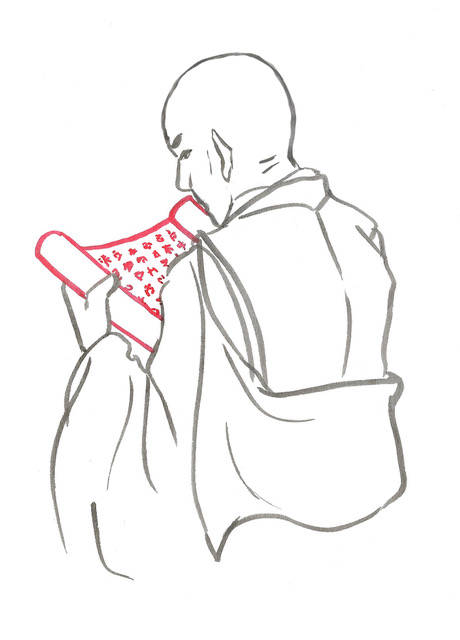Time in Sen’e’s and Kyōgō’s Commentaries on the Shōbōgenzō
© Alexandra Ciorciaro 2019
Etienne A. F. Staehelin, M.A.
This research project aims to compare several conceptions of time within early Japanese Sōtō Zen Buddhism and to set the changes and differences between those concepts in relation to broader trends in contemporary Buddhism.
To achieve this, the thesis focuses on the writings of Dōgen Zenji (1200-1253) and his disciples. Dōgen, credited with importing Sōtō Zen Buddhism from China to Japan, is one of the select Japanese thinkers that have managed to garner considerable scholarly attention outside of Japan. The main reason for this is probably his extensive seminal work called the Shōbōgenzō, in which he conceptualises many fundamental aspects of human experience and existence. One of the main foci of academic scrutiny regarding the Shōbōgenzō is its theory of time in the fascicle of ‘Uji’. In it, Dōgen develops a complex, multi-layered concept of time which is linked inseparably to several aspects and dimensions of the physical and metaphysical worlds; such as all the things that exist, enlightenment, the self, and others. This fascicle ‘Uji’ is furthermore one of the subjects of the two oldest commentaries on the Shōbōgenzō. The first of those commentaries is the Kikigaki by Sen’e (?-?), who was Dōgen’s pupil, and the second is the Shōbōgenzōshō by Kyōgō (?-?), who in turn was Sen’e's disciple – together, the two texts are known as the Gokikigakishō, or Goshō.
Focusing on the fascicle ‘Uji’ of the Shōbōgenzō as well as on the corresponding passages in the two texts of the Goshō thus allows me to compare the conceptions of time of those three generations of Zen masters and to identify the changes that this concept underwent within that specific branch of early Sōtō Zen Buddhism. These changes will then be set in relation to the broader philosophical developments of the time, namely hongaku (original enlightenment) thought, which had developed during the preceding Heian period within the dominant Tendai school of esoteric Buddhism.
Hongaku thought is considered to have been a significant influence on the Buddhist schools that emerged in early medieval times, such as Dōgen‘s Sōtō school. Its impact on Sen‘e‘s and Kyōgō’s thought has been demonstrated to some extent (e.g., in Yamauchi Shun‘yū‘s extensive work on the Goshō) – however, not in the context of their conceptions of time. A philological and philosophical analysis of several key texts of hongaku thought, such as the Sanjūshika no kotogaki or the Shin‘nyokan, should thus reveal how and to which extent hongaku thought shaped Sen‘e‘s and Kyōgō’s thought.
In this way, concentrating on Dōgen and his two disciples I will track the development of the conception of time within early Japanese Sōtō Zen Buddhism. Based on that, I will analyse how this relates to hongaku thought as the most dominant trend shaping Buddhist thinking at the time.



